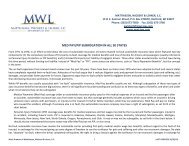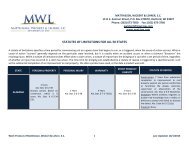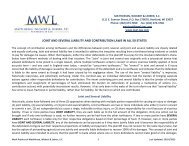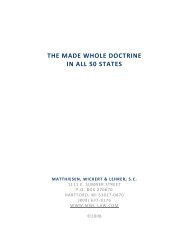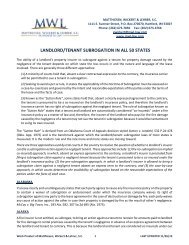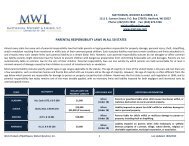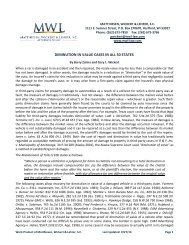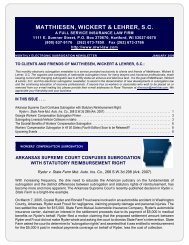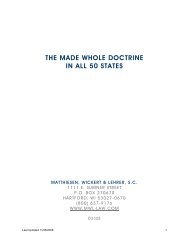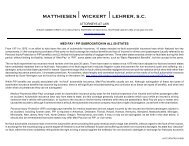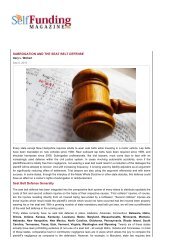Employee Leasing Subrogation Laws In All 50 States - Matthiesen ...
Employee Leasing Subrogation Laws In All 50 States - Matthiesen ...
Employee Leasing Subrogation Laws In All 50 States - Matthiesen ...
Create successful ePaper yourself
Turn your PDF publications into a flip-book with our unique Google optimized e-Paper software.
MATTHIESEN, WICKERT & LEHRER, S.C.<br />
1111 E. Sumner Street, P.O. Box 270670, Hartford, WI 53027<br />
Phone: (262) 673-78<strong>50</strong> Fax: (262) 673-3766<br />
gwickert@mwl-law.com<br />
www.mwl-law.com<br />
EMPLOYEE LEASING SUBROGATION LAWS IN ALL <strong>50</strong> STATES<br />
Each state varies with its application of the Exclusive Remedy Rule to situations involving employee leasing companies and temporary employees. Some states<br />
set forth the respective rights of a worker and/or potential third-party tortfeasor in the workers’ compensation subrogation statute or other statutes, while<br />
other states make declarations in established case law. Thirty-three states have statutes or regulations which address employee leasing and its effect on which<br />
entity is the actual employer, while 17 states and the District of Columbia make such determinations via court decisions. Below is an exposition of the laws for all<br />
<strong>50</strong> states.<br />
Alabama: An employee of a temporary services agency was also held to be an employee of the client company to which she was assigned to work for purposes<br />
of workers’ compensation, where the client company supervised her work and paid a fee to the temporary services agency which included an amount to obtain<br />
workers’ compensation insurance for the worker. Marlow v. Mid South Tool Co., <strong>In</strong>c., 535 So.2d 120 (Ala. 1988).<br />
Alaska: There is very little precedence and no statutory guidance given to us in Alaska. However, one case leads us to believe that both the general and special<br />
employers will be afforded protection under the Exclusive Remedy Rule. Ruble v. Arctic Gen., <strong>In</strong>c., 598 P.2d 95 (Alaska 1979).<br />
Arizona: Arizona’s statute dictates that a professional leasing organization is given protection under the Exclusive Remedy Rule as a co-employer of the worker.<br />
A.R.S. § 23-901.08. However, in order to be given immunity under the Exclusive Remedy Rule, the parties must be in compliance with various regulations and<br />
rules regarding employee leasing.<br />
Arkansas: <strong>In</strong> Arkansas, a specific statute governs Professional Employer Organizations (PEO). It provides that both the employer organization and its client are<br />
considered co-employers, and both may avail themselves of the immunity provided under the Exclusive Remedy Rule. A.C.A. § 23-92-409.<br />
California: <strong>In</strong> California, both the employee leasing firm and its client are considered to have made workers’ compensation insurance premium payments, and<br />
both are immune from a third-party suits, provided an employee leasing agreement has been executed and insurance coverage for the worker remained in<br />
effect throughout the length of his employment. Ann. Cal. Labor Code § 3602(d).<br />
Colorado: By statute, Colorado allows the leasing company to be considered a “co-employer” of a work site employer’s employee, provided the leasing company<br />
actually instructs the employees at the work site, it sets and actually pays the employee’s compensation, and retains the right to control the details of the<br />
employee’s work. C.R.S. § 8-70-114(2).<br />
Connecticut: The Connecticut statute provides that the employer who originates a contract where an employee is loaned to another employer is ultimately<br />
responsible to the worker for all benefits. C.G.S.A. § 31-292. Section 31-284 provides:<br />
Work Product of <strong>Matthiesen</strong>, Wickert & Lehrer, S.C. 1 Last Updated: 2/19/2013
“... all rights and claims between an employer who complies with the requirements of Subsection (b) of this section and employees, or any representatives<br />
or dependents of such employees, arising out of personal injury or death sustained in the course of employment are abolished other than rights in claims<br />
given by this chapter ...” C.G.S.A. § 31-284.<br />
Delaware: While there are no statutes or cases which directly determine the respective subrogation rights against an employee leasing company or its client,<br />
most likely, both are going to be afforded protection under the Exclusive Remedy Rule. Porter v. Pathfinder Services, <strong>In</strong>c., 683 A.2d 40 (Del. 1996).<br />
District of Columbia: The special employer is entitled to protection under the exclusive remedy provisions of the Workers’ Compensation Act, just as is the<br />
actual employer. Thomas v. Hycon, <strong>In</strong>c., 244 F. Supp. 151 (D.C. 1965).<br />
Florida: Any employer who utilizes the services of an employee leasing service is entitled to immunity under the Exclusive Remedy Rule. F.S.A. § 440.11(2).<br />
However, such immunity will only extend to an employer and to each employee of the employer who utilizes the services of the employees of a help supply<br />
services company as set forth in Standard <strong>In</strong>dustry Code <strong>In</strong>dustry Number 7363.<br />
Georgia: Employers are immune from suit under the Exclusive Remedy Rule when utilizing employee leasing companies or temporary help agencies, provided<br />
that workers’ compensation benefits are provided to a worker by either the leasing employer or the employee leasing company. O.C.G.A. § 34-9-11(c).<br />
Hawaii: Hawaii’s statutes do not address the issue. Although there are no cases directly interpreting employee leasing situations, the Hawaii Supreme Court has<br />
held that a temporary employer utilizing an employee from a temporary agency was entitled to the exclusive remedy protection because it had paid a fee to the<br />
temporary agency, which the court construed to include the cost of workers’ compensation insurance premiums. Frank v. Hawaii Planing Mill Foundation, 963<br />
P.2d 349 (Haw. 1998).<br />
Idaho: Similar to Georgia, if either the employee leasing company or its client provides workers’ compensation coverage to the employee, both entities are<br />
protected under the Exclusive Remedy Rule. Idaho Code § 72-103.<br />
Illinois: Illinois’ statute provides that unless the employee leasing contract specifies otherwise, both the employee leasing company and the client employer are<br />
protected by the Exclusive Remedy Rule. 215 I.L.C.S. 113/45.<br />
<strong>In</strong>diana: <strong>In</strong>diana’s statute dictates that the employee leasing company is considered the employer of any employee leased to the client company. I.C. § 27-16-9-<br />
1. The employee leasing company is known in <strong>In</strong>diana as a Professional Employer Organization (PEO). A professional employer agreement must specify the<br />
allocation of the responsibility of obtaining workers’ compensation coverage to either the client or the PEO. I.C. § 27-16-7-2. If this duty is met, a client and a PEO<br />
are both considered the employer of a covered employee for purposes of the Exclusive Remedy Rule. I.C. § 27-16-9-2.<br />
Iowa: Unless there is a contract of hire between the temporary employee company and the client company, the client company will not be considered an<br />
employer and is subject to a third-party action brought by the worker. However, when a contract of hire exists, the client company is considered the worker’s<br />
employer and is immune under the Exclusive Remedy Rule. Fletcher v. Apache Hose & Belting Co., <strong>In</strong>c., 519 N.W.2d 839 (Iowa App. 1994); Parsons v. Procter &<br />
Gamble Mfg. Co., 514 N.W.2d 891 (Iowa 1994); Swanson v. White Consolidated <strong>In</strong>dus., <strong>In</strong>c., 77 F.3d 223 (8 th Cir. 1996).<br />
Kansas: Neither statute nor case law has decided whether or not an employee leasing company and the client company are considered employers for purposes<br />
of the Exclusive Remedy Rule. However, if an employee becomes a borrowed servant, the special employer is immune to any third-party actions. Hollingsworth<br />
v. Fehrs Equip. Co., 729 P.2d 1214 (Kan. 1986).<br />
Kentucky: Under Kentucky law, the employee leasing company is considered the statutory employer of any leased employee. K.R.S. § 342.615.<br />
Work Product of <strong>Matthiesen</strong>, Wickert & Lehrer, S.C. 2 Last Updated: 2/19/2013
Louisiana: The employee leasing company and its client company are both considered employers and both are protected by the Exclusive Remedy Rule. La. R.S.<br />
§ 22:1210.56(C).<br />
Maine: Maine has a special statute dealing with employee leasing companies, located in Title 32, Chapter 125: <strong>Employee</strong> <strong>Leasing</strong> Companies. Provided that the<br />
employee leasing company or the client company secures workers’ compensation coverage, both entities are considered employers and immune from thirdparty<br />
suits under the Exclusive Remedy Rule. Me. Rev. Stat. Ann. Tit. 32 § 14055(1).<br />
Maryland: Maryland case law holds that where there is an implied contract of hire between an employee provided by a temporary services agency and the client<br />
company, the client company is considered the employee’s special employer and is afforded protection under the Exclusive Remedy Rule. Travelers <strong>In</strong>dem. Co. v.<br />
<strong>In</strong>s. Co. of North Am., 519 A.2d 760 (Md. App. 1987). The employee is considered jointly employed by the temporary services agency and the client company.<br />
Massachusetts: It appears that Massachusetts allows an employee to sue a client company. Margolis v. Charles Precourt & Sons, <strong>In</strong>c., No. 97-4029 (May 6, 1999)<br />
(unpublished); Home <strong>In</strong>s. Co. v. Liberty Mut. Fire <strong>In</strong>s. Co., 830 N.E.2d 186 (Mass. 2005).<br />
Michigan: The employee leasing company and its client company are both considered employers and immune from third-party actions under the Exclusive<br />
Remedy Rule. Renfroe v. Higgins Rack Coating & Mfg. Co., 169 N.W.2d 326 (Mich. App. 1969).<br />
Minnesota: Minnesota deals with employee leasing situations in its Workers’ Compensation Statute. It provides that when an employee leasing company and a<br />
client company are engaged in a common enterprise, the injured worker may proceed against either the employer for benefits or the responsible third party for<br />
damages. M.S.A. § 176.061.<br />
Mississippi: The temporary employment agency and the client company are both considered employers and immune from third-party actions under the<br />
Exclusive Remedy Rule. Northern Electric Co. v. Phillips, 660 So.2d 1278 (Miss. 1995).<br />
Missouri: When work is performed under a contract involving leasing or borrowing of an employee, and an injury occurs on or about the premises of the alleged<br />
statutory employer and the alleged statutory employee was doing work in the usual course of business of the alleged statutory employer, the worker is<br />
considered a statutory employee of the special employer and cannot be sued under the Exclusive Remedy Rule. Wilson v. Altruk Freight Sys., <strong>In</strong>c., 820 S.W.2d<br />
717 (Mo. App. 1991). <strong>Employee</strong> leasing companies are not specifically dealt with in the Workers’ Compensation Act or in case law.<br />
Montana: An employee leasing company and its client company are both considered employers and immune from third-party actions under the exclusive<br />
remedy provision of the Workers’ Compensation Act. Mont. St. § 39-8-207.<br />
Nebraska: An employee leasing company and its client company are both considered employers for purposes of the Exclusive Remedy Rule, and are immune<br />
from third-party actions. Schwartz v. Riekes & Sons, 240 N.W.2d 581 (Neb. 1976).<br />
Nevada: Provided there is a written agreement between the employee leasing company and the client company, as well as meeting several other conditions set<br />
forth in the Nevada’s statute, an employee leasing company in compliance with the leasing provisions set forth in the Act is considered the employer for<br />
purposes of the Act. N.R.S. § 616B.691.<br />
New Hampshire: An employee leasing company must be certified by the insurance commissioner to meet certain criteria. If it does, it’s considered the employer<br />
of the leased employee under the <strong>Employee</strong> <strong>Leasing</strong> Company Act. The employee leasing company and client company are both entitled to protection under the<br />
Exclusive Remedy Rule. N.H. Rev. Stat. Ann. § 277-B:9 and 10.<br />
New Jersey: An employee leasing company must register with the State under the State’s statutes. If it does, the employee leasing company and the client<br />
company are both considered employers and immune from third-party actions under the Exclusive Remedy Rule. N.J.S.A. § 34:8-72.<br />
Work Product of <strong>Matthiesen</strong>, Wickert & Lehrer, S.C. 3 Last Updated: 2/19/2013
New Mexico: If certain conditions are met, the employee leasing company and the client company are both considered to be employers and immune from thirdparty<br />
actions under the Exclusive Remedy Rule. N.M.S.A. § 60-13A-5 (1978).<br />
New York: Neither the New York Workers’ Compensation Act or case law directly addresses employee leasing. However, the issue is addressed by Rule 11G of<br />
the New York Workers’ Compensation and Employers Liability Manual. New York refers to the employee leasing company as the “labor contractor”, and refers to<br />
the client company as the “client”. Although it does not apply to temporary workers, Rule 11G provides that both parties must provide workers’ compensation<br />
coverage for the leased employee but does not specifically extend the Exclusive Remedy Rule to the client company.<br />
North Carolina: Neither North Carolina Workers’ Compensation Act nor case law directly addresses the Exclusive Remedy Rule as applied to employee leasing<br />
situations. However, a court has held that a temporary employee could not pursue a third-party action against the employer to whom the worker was assigned.<br />
Brown v. Friday Services, <strong>In</strong>c., 460 S.E.2d 356 (N.C. App. 1995).<br />
North Dakota: Both the employee leasing company and the client company are considered employers and immune from third-party actions when the two<br />
entities have secured the payment of compensation in accordance with North Dakota law. N.D.C.C. § 65-01-08.<br />
Ohio: Neither the Ohio Workers’ Compensation Act nor case law directly addresses the issue. However, employee leasing and temporary employee situations<br />
are dealt with in the Bureau of Workers’ Compensation Rules. Ohio Adm. Code § 4123-17-15. Workers provided by an employee leasing company are considered<br />
employees of the employee leasing company. An employee leasing company is referred to as a Professional Employer Organization (PEO) in Ohio. There does<br />
not appear to be any cases clearly delineating whether the client company is entitled to protection under the Exclusive Remedy Rule.<br />
Oklahoma: Neither the Oklahoma Workers’ Compensation Act nor case law directly addresses the Exclusive Remedy Rule in connection with employee leasing<br />
situations. The Oklahoma Court of Appeals, however, has held that a worker assigned by a temporary agency to a client company is considered a loan servant,<br />
and that both employers are responsible for the provision of workers’ compensation, and therefore cannot be sued in a third-party action. Zant v. People Electric<br />
Co-op., 900 P.2d 1008 (Okla. App. 1995).<br />
Oregon: The employee leasing company and the client company are both immune from third-party actions under the Exclusive Remedy Rule, provided they<br />
comply with all of the provisions required under the Act. O.R.S. § 656.020 and O.R.S. § 656.8<strong>50</strong>.<br />
Pennsylvania: Neither the Pennsylvania Workers’ Compensation Statute nor Pennsylvania case law sheds any light on the issue of whether or not an employee<br />
leasing company and the client company are entitled to protection under the Exclusive Remedy Rule in Pennsylvania. The determination of who is the employer<br />
in leasing situations is addressed via common law factors involving which entity controls and directs the details of the work being performed by the employee.<br />
American Rock Mechanics, <strong>In</strong>c. v. W.C.A.B. (Bik & Lehigh Concrete Technologies), 881 A.2d 54 (Pa. Commw. Ct. 2005).<br />
Rhode Island: Rhode Island case law has held that an employee leasing company remains the employer of a leased employee as long as the employer remains<br />
on the general employer’s payroll, but the employee leasing company and the client company are both considered employers for purposes of the Exclusive<br />
Remedy Rule. Sorenson v. Colibri Corp., 6<strong>50</strong> A.2d 125 (R.I. 1994).<br />
South Carolina: <strong>Employee</strong> leasing companies and staff leasing services are governed by § 40-68-70 of the South Carolina Statutes. <strong>In</strong> order to be a statutory<br />
employee under the Workers’ Compensation Act, a worker must be engaged in an activity that “is a part of the client company’s trade, business, or occupation”.<br />
S.C. St. § 42-1-400. This statutory requirement has been construed to include activities that: (1) are an important part of the employer’s trade or business of the<br />
employer; (2) are a necessary, essential, and integral part of the employer’s business; or (3) have previously been performed by employer’s employees. Glass v.<br />
Dow Chemical Co., 482 S.E.2d 49 (S.C. 1997). Only one of these tests must be met in order for a subcontractor’s employee to be considered a statutory employee<br />
of the owner and immune from third-party actions as a result of the Exclusive Remedy Rule. Woodard v. Westvaco Corp., 433 S.E.2d 890 (S.C. App. 1993),<br />
vacated on other grounds, 460 S.E.2d 392 (1995).<br />
Work Product of <strong>Matthiesen</strong>, Wickert & Lehrer, S.C. 4 Last Updated: 2/19/2013
South Dakota: Neither the South Dakota Workers’ Compensation Act nor case law shed any light on the issue involving the Exclusive Remedy Rule and employee<br />
leasing companies. This issue, most likely, will be determined by applying common law factors to determine who is the employer, and who is the third party<br />
subject to suit.<br />
Tennessee: Tennessee has a specific statute dealing with employee leasing. Both the employee leasing company and the client company are entitled to the<br />
exclusive remedy protection based on a worker’s compensation policy secured by either entity. T.C.A. § 62-43-113.<br />
Texas: Texas enacted the Texas Staff <strong>Leasing</strong> Services Act, which addressed the use of leased employees and their employers in Texas. Tex. Lab. Code § 91.001,<br />
et seq. <strong>In</strong> particular, § 91.042 reads as follows:<br />
(a) A license holder (person licensed to provide staff leasing services) may elect to obtain workers’ compensation insurance coverage for the license<br />
holder’s assigned employees through an insurance company as defined under § 401.011(28) or through self insurance as provided under Chapter 407.<br />
(b) If a license holder maintains workers’ compensation insurance, the license holder shall pay workers’ compensation insurance premiums based on the<br />
experience rating of the client company for the first two years the client company has a contract with the license holder and as further provided by the<br />
Texas Department of <strong>In</strong>surance.<br />
(c) For workers’ compensation insurance purposes, a license holder and the license holder’s client company shall be co-employers. If a license holder elects<br />
to obtain workers’ compensation insurance, the client company and the license holder are subject to § 406.034 and § 408.001 (the workers’<br />
compensation statute provisions protecting employers from liability for tortuous acts).<br />
(d) If a license holder does not elect to obtain workers’ compensation insurance, both the license holder and the client company are subject to §§ 406.004<br />
and 406.033.<br />
(e) After the expiration of the two-year period under Subsection (b), if the client company obtains a new workers’ compensation insurance policy in the<br />
company’s own name or adds the company’s former assigned workers to an existing policy, the premium for the workers’ compensation insurance policy<br />
of the company shall be based on the lower of:<br />
(1) the experience modifier of the company before entering into the staff leasing arrangement; or<br />
(2) the experience modifier of the license holder at the time the staff leasing arrangement terminated.<br />
(f) On request, the Texas Department of <strong>In</strong>surance shall provide the necessary computations to the prospective workers’ compensation insurer of the<br />
client company to comply with Subsection (e). Texas Labor Code § 91.042 (1995).<br />
Therefore, the Texas Staff <strong>Leasing</strong> Services Act codified the dual employment theory in Texas and held that in staff leasing situations, both the leasing company<br />
and customer are considered employers. Most, if not all, efforts by the general employee’s workers’ compensation carrier to equitably subrogate or seek<br />
equitable contribution against the workers’ compensation carrier for the special employer ceased with this statute. Due to the theory of contribution being<br />
equitable in nature, the court considered the fact that it was contemplated by the parties that the leased staff would have their workers’ compensation<br />
premiums paid for by the general employer (the staff leasing company). The Staff <strong>Leasing</strong> Services Act, however, does not cover providers of temporary workers.<br />
The term “staff leasing services” within the Act does not include temporary help or a temporary common worker employer. The Staff <strong>Leasing</strong> Services Act<br />
applies to arrangements in which the employee’s assignment is intended to be long-term or continuing in nature, rather than temporary or seasonal in nature,<br />
and where a majority of the workforce at a client company work site is a specialized group within that workforce consisting of assigned employees of the license<br />
holder. Wingfoot Enter. v. Alvarado, 111 S.W.3d 134 (Tex. 2003).<br />
Work Product of <strong>Matthiesen</strong>, Wickert & Lehrer, S.C. 5 Last Updated: 2/19/2013
Utah: The employee leasing company and the client company in an employee leasing situation are both entitled to protection under the exclusive remedy<br />
provisions of the Utah Workers’ Compensation Act, provided the employee leasing arrangement meets the requirements of the <strong>Employee</strong> <strong>Leasing</strong> Company<br />
Licensing Act. U.C.A. § 34A-2-102(3)(a) and U.C.A. § 34A-103(7)(e).<br />
Vermont: Both the leasing company and the client company are immune from third-party actions based on the Exclusive Remedy Rule. Vt. Stat. Ann. Tit. 21, §<br />
12-1037.<br />
Virginia: Both the employee leasing company and the client company are afforded protection by the exclusive remedy provisions of the Virginia Workers’<br />
Compensation Act. Va. St. § 65.2-803.1.6.<br />
Washington: Neither the Washington Workers’ Compensation Act nor case law directly give us guidance on employee leasing situations, and such questions will<br />
be answered by common law under Washington case decisions.<br />
West Virginia: Neither the West Virginia Workers’ Compensation Act nor case law give us direct answers to employee leasing situations. However, the 4 th Circuit<br />
has indicated that a worker assigned by a temporary agency is a loan servant and therefore was not entitled to bring a third-party action against the client<br />
company, who was considered to be a special employer. Maynard v. Keynard Chemical Co., 626 F.2d 359 (4 th Cir. 1980).<br />
Wisconsin: Section 102.29 provides that no employee of a temporary help agency who makes a claim for compensation may make a claim or maintain an action<br />
in tort against any employer who compensates the temporary agency for the employee’s services. Wis. Stat. § 102.29(6). Furthermore, no employee who is<br />
loaned by his or her employer to another employer and who makes a claim for workers’ compensation may make a claim or maintain an action in tort against<br />
the employer who accepted the loaned employee’s services. Wis. Stat. § 102.29(7).<br />
Wyoming: The Wyoming Workers’ Compensation Act defines a temporary service contractor as an entity that employs individuals directly for the purpose of<br />
furnishing services of the employed individuals on a temporary basis to others. Wyo. St. § 27-14-102(a). The Act also designates that the employer is considered<br />
to be the entity utilizing the services of a worker furnished by another, except in the instance of a temporary service contractor. Wyo. St. § 27-14-102(a). The<br />
entity considered the employer is immune from third-party actions by virtue of the exclusive remedy provisions of the Act.<br />
It is important for subrogation professionals to familiarize themselves with the lay of the land when evaluating subrogation potential in employee leasing<br />
situations, regardless of which state you are subrogating in. Knowing who can be sued and when is extremely critical in evaluating your recovery chances and<br />
performing the necessary due diligence and investigation necessary to preserve your rights to bring a third-party action and recoup your claim payments. For<br />
additional questions involving employee leasing or temporary employment scenarios, please contact Gary Wickert at gwickert@mwl-law.com.<br />
These materials and other materials promulgated by <strong>Matthiesen</strong>, Wickert & Lehrer, S.C. may become outdated or superseded as time goes by. If you should have questions<br />
regarding the current applicability of any topics contained in this publication or any of the publications distributed by <strong>Matthiesen</strong>, Wickert & Lehrer, S.C., please call Gary<br />
Wickert at (800) 637-9176 or gwickert@mwl-law.com. This publication is intended for the clients and friends of <strong>Matthiesen</strong>, Wickert & Lehrer, S.C. This information should<br />
not be construed as legal advice concerning any legal advice concerning any factual situation and representation of insurance companies and\or individuals by <strong>Matthiesen</strong>,<br />
Wickert & Lehrer, S.C. on specific facts disclosed within the attorney\client relationship. These materials should not used in lieu thereof in anyway.<br />
Work Product of <strong>Matthiesen</strong>, Wickert & Lehrer, S.C. 6 Last Updated: 2/19/2013



